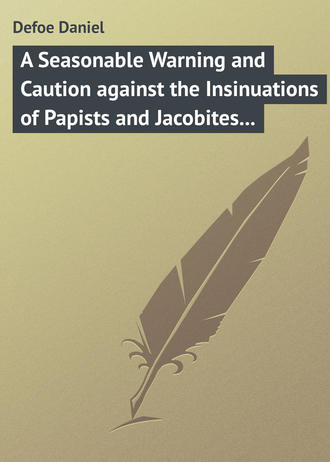 полная версия
полная версияA Seasonable Warning and Caution against the Insinuations of Papists and Jacobites in favour of the Pretender Being a Letter from an Englishman at the Court of Hanover
When set upon the British throne, who are his allies and confederates? Will he be so ungrateful as not to be always at the devotion and command of the French king? a prince that took his father in a fugitive, an abdicated and ruined prince, when his fortunes were overthrown, and his crown taken from him; that made so many efforts to restore him, and hazarded his whole kingdom for it: if he forgets the kindness shown to his father, can he be so ungenerous, so unthankful, as to forget how the king of France nourished him from a child; how, after his father's death, he hazarded a second war to proclaim him king of Great Britain, and what expense he has been at to put him in possession of it? Should he forget all these obligations, he must be unfit to be called a Christian, much less a prince.
If he can act so barbarously to the French king, his benefactor, what must you Britons expect from him, who have done nothing to oblige him, but have for twenty-four years kept him and his father in exile, and treated them both with unsufferable indignity? If he can be ungrateful to the king of France, who has done so much for him, what must he be to you, who have done so much against him?
Again: if gratitude and honour have any influence upon him, if he has any sense of his obligation to the French king, will he not for ever be his most hearty, obedient, humble servant? Will he not always be in his interest, nay, ought he not to be so? Is he not tied by the laws of friendship and gratitude to be so?
Think, then, dear Britons! what a king this pretender must be; a papist by inclination; a tyrant by education; a Frenchman by honour and obligation: and how long will your liberties last you in this condition? And when your liberties are gone, how long will your religion remain? When your hands are tied; when armies bind you; when power oppresses you; when a tyrant disarms you; when a popish French tyrant reigns over you; by what means or methods can you pretend to maintain your protestant religion?
How shall the Church of England stand, when in subjection to the Church of Rome? You are now mixed with dissenters, and some are uneasy enough with them too; but our church will then be but a dissenting church; popery will be the establishment; the mass will succeed our common prayer, and fire and fagot instead of toleration, as you know was our case before; for it is not the first time the papists have been tried.
Nor did Queen Mary promise, nay, swear less than is now promised for the pretender; for she swore to the Gospellers of Suffolk to make no alteration in religion; and they, like the blinded protestants of this age, brought her in, for which they were the first that felt the fury and rage of the popish party, and so we have great cause to believe it would be again.
The Conclusion
Consider, then, honest countrymen and protestants, what you are doing; look on your families; consider your innocent children, who you are going to give up to be bred in abominable superstition and idolatry; look on your dear country, which you are preparing to make the seat of war, blood, and confusion; look on your neighbours, who, while they are resisting this inundation, for you may be assured honest men will resist it to the last, you are to fight with, whose throats you must cut, and in whose blood you must dip your hands; and, lastly, consider yourselves; how free, how quiet, how in peace, plenty, and in protestant liberty you now live, but are with your own hands pulling down upon you, so far as you entertain thoughts of the pretender, the walls of your own security, viz., the constitution, and making way for your French popish enemies to enter; to whom your religion, your liberties, your estates, your families, and your posterity, shall be made a sacrifice, and this flourishing nation be entirely ruined.
In the last place, all that have any concern left for the good of their country, and for the preserving the protestant religion, will remember how much it is in the power of the people of Britain for ever to discourage all the attempts to be made in favour of these popish enemies, and to overthrow them in the execution; and it is on this foundation that this paper is made public. The late letter from Douay, written by some of that side, who very well understood the pretender's true interest, acknowledges this, and that if the people of England could not be wheedled and deluded into the design, it was never to be done by force.
And is this your case, Britons! Will you be ruined by a people whom you ought to despise? Have they not been twenty years trying your strength, till they find it impossible for them to master you? And are they brought to such a condition as to use all their arts and shifts to bring on a peace; and will you be brought now in cool thoughts, and after so long a struggle, to do that yourselves which you would never let them do; and which, without your most stupid negligence of yourselves, they could never do.
For this reason, I say, these lines are written, and this makes them just, and the argument rational. If I were to move you to what was not in your power, I should easily be answered, by being told, you could not do it; that you were not able, and the like; but is it not evident that the unanimous appearance of the people of Great Britain against the pretender would at once render all the party desperate, and make them look upon the design as utterly impracticable. As their only hope is in the breaches they are making in your resolutions, so if they should see they gain no ground there, they would despair, and give it over.
It would not be worth notice to inquire who are, and who are not for the pretender; the invidious search into the conduct of great men, ministers of state and government, would be labour lost: no ministry will ever be for the pretender, if they once may but be convinced that the people are steady; that he gets no ground in the country; that the aversions of the common people to his person and his government are not to be overcome: but if you, the good people of England, slacken your hands; if you give up the cause; if you abate your zeal for your own liberties, and for the protestant religion; if you fall in with popery and a French pretender; if you forget the revolution, and King William, what can you expect? who can stand by you then? Who can save them that will destroy themselves?
The work is before you; your deliverance, your safety is in your own hands, and therefore these things are now written: none can give you up; none can betray you but yourselves; none can bring in popery upon you but yourselves; and if you could see your own happiness, it is entirely in your power, by unanimous, steady adhering to your old principles, to secure your peace for ever. O Jerusalem! Jerusalem!
END OF A SEASONABLE WARNING AND CAUTION1
Edward II., Richard II., Richard III., James II.
2
In the several barons' wars in the reign of King Stephen, King John, &c.
3
Especially of the persecuted protestants in the Low Countries, in Queen Elizabeth.
4
Henry IV., who turned papist, and with much difficulty granted liberty to his protestant subjects by the edict of Nantes.
5
The French refugees, who being received here, are grown rich and wealthy by our trade.
6
The Flemings, when threatened with the inquisition from Spain, under the reign of Philip II.
7
Under William Henry, the first Prince of Orange, who formed the revolt of the Dutch provinces, and laid the foundation of the States General and their commonwealth.
8
The circles of Swabia and Franconia, the Palatinate, and the countries of Hessia, Wirtemberg, and others.
9
The Thanksgiving for the Revolution.
10
Monthly fasts appointed the first Wednesday of every month during the war in King William's time.
11
Vid. The Collection of Addresses in King William's reign.
12
Act for Offering the Crown; The Claim of Right; Act for Security of his Majesty's Person and Government, &c.
13
Vid. The several Prayers ordered to be read in Churches upon the occasion of the Fasts in King William's time.
14
Vid. The Act of the Settlement, and the Act of the Union; the Act to extinguish the hopes of the Jacobites; and the Act for farther securing her Majesty's Person and Government.
15
Vid. The Act of Parliament for settling the Succession of the Crown on the illustrious House of Hanover.









